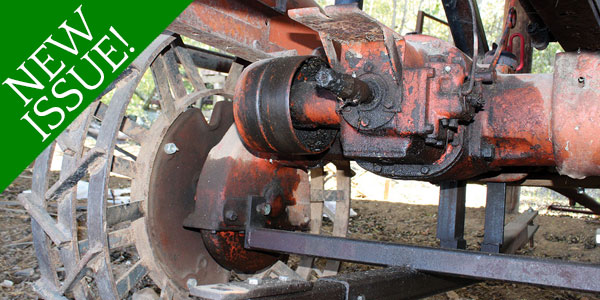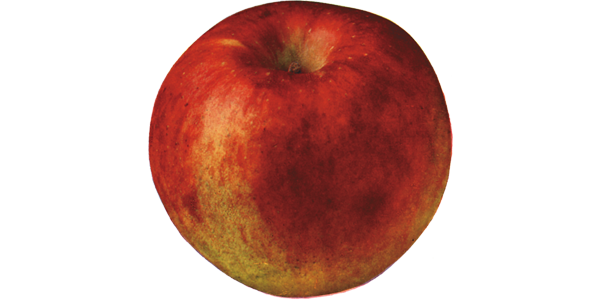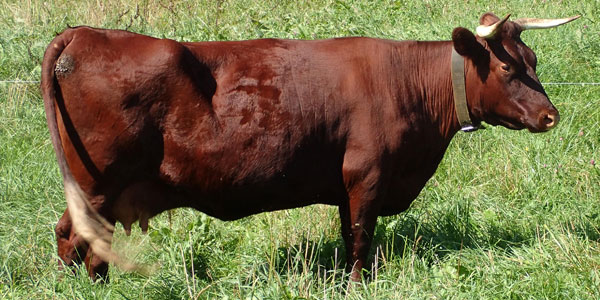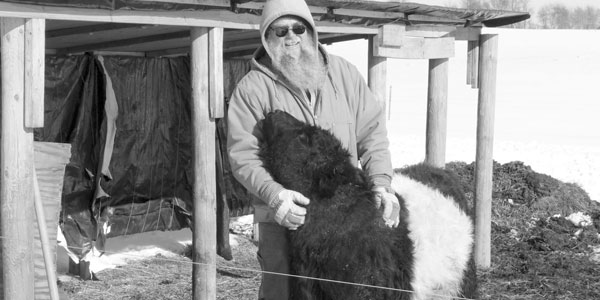
Rainbow Hill Farm
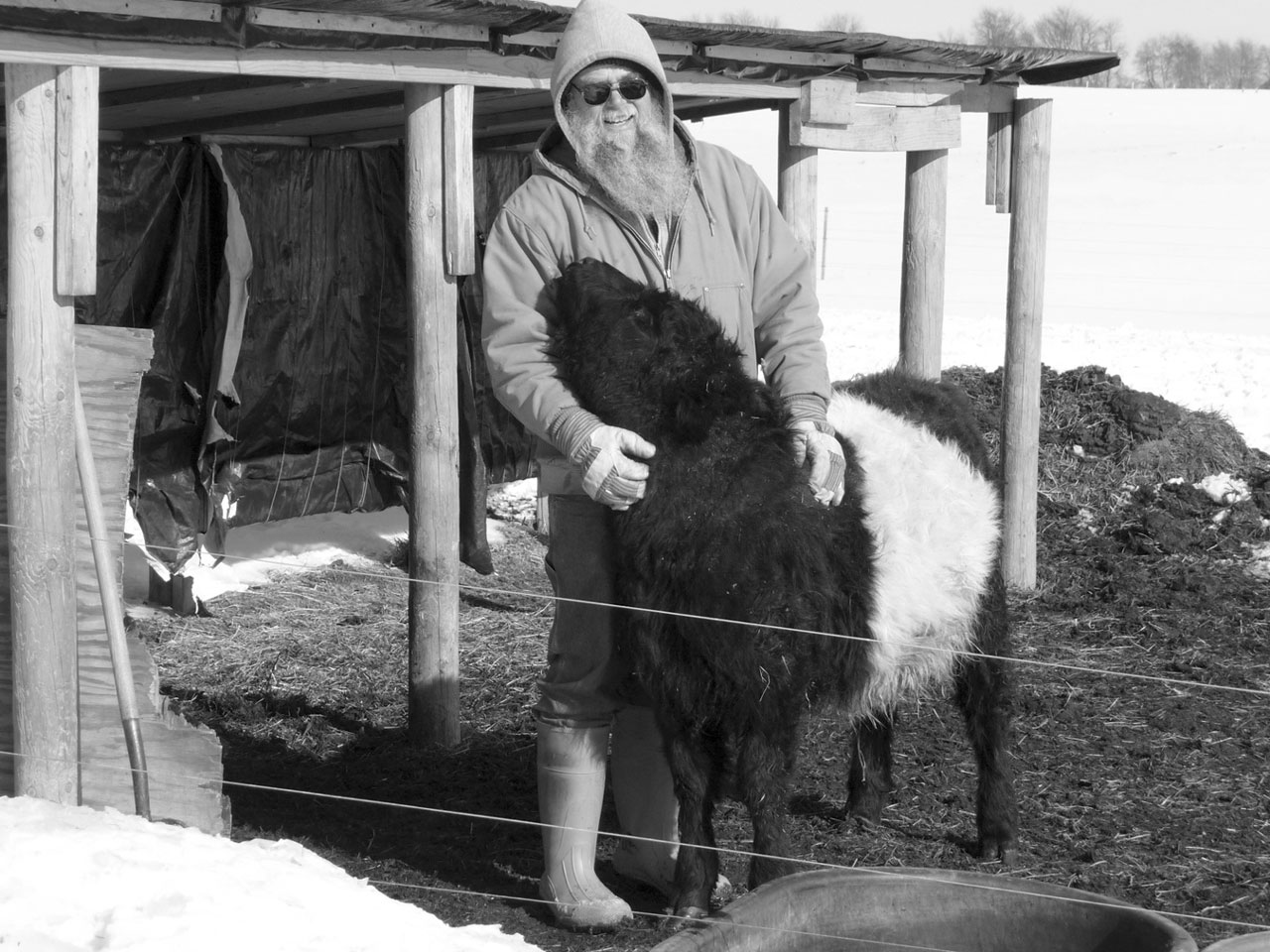
Rainbow Hill Farm
a profile by Rex A. Owens of Marshall, WI
As Dennis and Sue Mengeling stand on the crest of their 130 acre farm, the land slopes down in all directions. As they look toward the north the Wisconsin River flows to the southwest. To the south is Voss Road and to the west County Road V and in the distance you can again glimpse the Wisconsin River. They look to the west and hope for rain in the next few days. This evening they will walk the perimeter of the farm, checking on fence and the cattle as they do several times a week. The farm was named because rainbows can be seen frequently on the knoll of the farm following a rain shower.
In 1989 when Dennis and Sue purchased the farm it had a small crop of hay and corn with not a single building. It took 12 years before they could afford to build a log cabin on the property. They took time out to experience living in Alaska, but found they missed Wisconsin and decided to return to work on their dream of developing a sustainable farm and living the good country life.
Before farming, Dennis worked at several careers including teaching and working in the insurance industry while Sue maintains a career in physical therapy. Sue still works part-time as a physical therapy case manager for a health management organization in Madison. Dennis is a full time farmer.
The Mengelings are motivated by a dream to work their own land but had no idea where to start since neither Dennis nor Sue has a farming background. In 2001 they built a log cabin home and decided to raise 25 cross-bred chickens both for harvesting and egg production. They’ve changed breeds several times and now have 65 free range Buff Orpingtons used primarily for egg production. Fox are a constant threat when raising free range chickens because it’s difficult to protect the chickens. This year the fox are more aggressive than usual and attacked during the day killing three chickens before being chased off. Each year, with the help of friends, they harvest about a third of the flock and give chickens to their friends for helping with the harvest.
With their success at raising chickens they were ready to take the next step in having a sustainable farm. Dennis and Sue consulted with the Columbia County Agriculture Agent and decided to raise 100% grass fed beef. A hearty breed was needed and they chose heritage Belted Galloway cattle. The Galloway breed originated in Galloway, Southwest Scotland where they grazed on the highlands. They have a double layer of hair which allows them to withstand Wisconsin winters. Because of their unique white belts they are sometimes called “police car cows” or “Oreo cows.”
In 2005 they purchased two Belted Galloway heifers, today the herd has grown to 30 cattle and this spring 14 calves were born. Last year Red Moon rejected her calf which is unusual and as yet unexplained. Dennis and Sue put the calf in the garage with hay and gave her milk by hand and named the calf Missy. Missy has bonded to Dennis and Sue while Red Moon, to this day, has never shown any interest in Missy. For a Galloway Missy is small so Dennis and Sue have decided not to raise her for harvest but as a pet. Missy is very friendly and will be the star when children and families visit the farm. When Dennis walks near the fence of the pasture Missy runs to greet him and get scratched on the back.
Based on additional research and demand, in 2007 they decided to raise pastured pork and purchased two feeder pigs. Demand for pastured pork has been much greater than anticipated and have added to their livestock every year. This year they purchased 12 feeder pigs with a plan to harvest all of them in the fall.
Because both Dennis and Sue were complete novices, their path to fulfill the dream of owning and maintaining a sustainable farm has required dedication, perseverance, research and humility. They have relied on the county agriculture agent and the Midwest Organic and Sustainable Education Service (MOSES) www.mosesorganic.org to guide them. They attend the annual grazing conference each year and have used the MOSES Certification guidebook extensively. As a result, the farm is listed on the Eatwild website, www.eatwild.com and the farm meets all criteria for being listed as an organic, sustainable farm. The farm is also listed in the 2010 Southern Wisconsin Farm Fresh Atlas.
Rainbow Hill Farm also supports other local businesses in the area. A butcher in Rio is used to harvest the animals, cut and vacuum package the meat. Dennis and Sue store frozen meat in the basement for direct sale to consumers. Dennis jokes that their harvest depends on the amount of freezer space they have available, not on how many cattle and pigs can be pastured on the farm. They also sell beef, pork and eggs at the Sun Prairie Farmer’s Market every Saturday from mid-June until the end of the season.
To accommodate the growth in livestock they’ve added a machine shed, a handling facility, a portable chicken coop, portable cattle shelters and electric fencing. Dennis uses portable cattle shelters because he rotates the pasture used by the cattle. The rotation allows the land to recover from grazing and guarantees fresh, high nutrient grass. The shelters provide shade in the summer and refuge from wind in winter. Dennis believes in sustainable farming and does not use growth-enhancing antibiotics, steroids, or hormones and the pasture is not treated with pesticides or herbicides.
Along with raising pastured animals, Dennis and Sue are dedicated to the ‘farm to fork’ connection between farmers and their customers. The beef and pork are sold directly at the Sun Prairie Farmers’ Market and two websites: www.eatwild.com and www.localharvest.org. The eatwild site requires that 11 criteria be certified in order to be listed on the site.
Their dream continues to evolve and now includes education. They use the opportunity at the Sun Prairie Farmers Market to strike up conversations about a healthy, sustainable lifestyle. They provide posters and handouts outlining how their animals are raised and how to cook the product to have a tasty, healthy eating experience. They also discuss the latest books and articles on healthy eating and sustainable farming practices. Standing nearly 6’ tall with his beard reaching the center of his chest and a broad brim hat it’s easy to recognize Dennis at his market stand.
Both Dennis and Sue are trained naturalists and in their spare time, what little there is, they have a project to restore a prairie in the southwest corner of the farm. Dennis has been a volunteer with the Dane County Parks Department and participated in many prairie restoration projects. He applies those skills to a section of Rainbow Hill Farm and adds plants to the prairie restoration area every year.
Their original dream to ‘live the good country life’ is a work in progress. They want to share their experiences with all their customers. Everyone is invited to visit the farm to see how the animals are raised and kids can meet and pet Missy. They encourage everyone to visit the farm, meet the Galloway cattle and stroll the 130 acres overlooking the scenic Wisconsin River with them but ask that you contact them before driving out to the farm.
